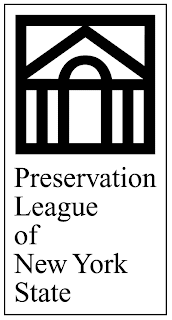 Upstate revitalization projects may soon be on a faster track, now that banks and insurance companies can more readily utilize New York State Rehabilitation Tax Credits to support commercial redevelopment projects according to the Preservation League of New York State.
Upstate revitalization projects may soon be on a faster track, now that banks and insurance companies can more readily utilize New York State Rehabilitation Tax Credits to support commercial redevelopment projects according to the Preservation League of New York State.
The legislation, sponsored by Senator David Valesky (D-Oneida) and Assemblymember Sam Hoyt (D-Buffalo, Grand Island), was seen as a key component in realizing the benefits of New York’s Historic Rehabilitation Tax Credits, by bringing new private investment to these efforts. The Governor signed the bill recently, and the new law takes effect immediately.
The League led a coalition of developers, financiers, municipal officials, architects, not-for-profits and other groups to make this change to bring new investments to bear on redevelopment projects in New York State by allowing banks and insurance companies to apply the state Rehabilitation Tax Credits against their New York State franchise tax liabilities.
Banks and insurance companies are among the most active users of the Federal rehabilitation tax credit. Previously, companies based outside of New York State could only apply the credit against their general corporate income tax liability, which reduced the incentive for many companies to invest in rehabilitation projects in the Empire State. These companies may now apply the rehabilitation tax credit program against their state franchise tax liability.
According to Daniel Mackay, the Preservation League’s Director of Public Policy, “This new law will allow a significantly larger pool of experienced and well-capitalized investors into the market for New York State Rehabilitation Tax Credits. This will enable several important projects to move forward, despite the recently-enacted state tax credit deferral program.”
In Part Y of the 2010-2011 Enacted Budget, tax credits for some thirty state business and economic development programs will be deferred to help balance the state spending plan, including incentives for the rehabilitation of commercial properties.
Critics worry that deferring incentives of the New York State Rehabilitation Tax Credit program will prevent projects from securing financing, as backers will no longer be assured of a timely return on investment. Homeowner rehabilitation projects are capped at $50,000 and are not affected by the deferrals.
“The Senate and Assembly will be returning to Albany in the coming weeks,” said Mackay, “and we will continue our advocacy in hopes of restoring the tax credit program to its intended format so that New York will finally begin to enjoy the long-sought economic and community redevelopment benefits of this program.”